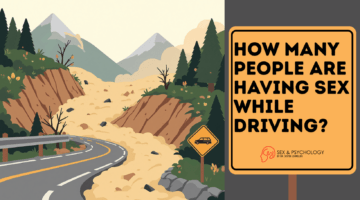What Reddit Users Reveal About AI Generated Pornography
September 24, 2025 by Merissa Prine
Pornography has long been a topic of interest of interest and debate among sex researchers. We’ve covered the science of porn many times before on the blog, including what trans and non-binary people’s experiences with porn are like, whether pornography is negatively impacting teenagers, and what even counts as porn. Lately, research has begun to explore how artificial intelligence (AI) is reshaping the world of porn, given that we’ve reached a point where people are starting to turn to AI to generate erotic images, videos, and stories.
AI-generated porn can include fully fictional characters and scenes, content that mimics real content, and even “deepfakes,” which refers to content that captures someone’s attributes and creates content based on their likeness, voice, and/or other features, often without the person’s permission. A recent literature review of AI pornography revealed that nearly all the studies focused on non-consensual deepfake content, to the exclusion of other types of AI-generated porn. So what are people’s general experiences with and perceptions of AI-generated pornography like?
Reddit Users’ Experiences of AI-Generated Porn
In an open-access article published earlier this year, a team of researchers from Germany and Australia looked at general perceptions of AI porn through an examination of posts by Reddit users. While some users spoke about deepfake content, there were other types of content addressed as well, such as completely fictional characters based on users’ fantasies. In their study, 390 Reddit posts were collected that focused on user experiences with AI-generated pornography.
Through their analysis of these posts, the researchers identified five overarching themes: (1) production, (2) content, (3) ethical-legal considerations, (4) effects, and (5) user experiences. In this post, we’re going to summarize the key findings.
How is AI-Generated Pornography Produced?
Production of AI porn was one of the most commonly reported themes in Reddit users’ posts. Some users spoke about producing AI pornography themselves and the specific tools they used, or they asked for advice from others on how to use AI to generate porn. For example, one user was struggling to generate the type of content they wanted and reached out to the Reddit community for help. However, production also has a dark side. Other users spoke about porn that was produced based on their appearance without their consent, highlighting how production of AI porn can (and does) harm others sometimes.
What Kinds of Content are Covered?
In addition to production, users frequently commented on the content of AI porn, especially things like who appears, what acts are shown, and the physical traits of the people portrayed. Many described content based on real people. For example, some women reported that their partners had made pornography involving themselves, their friends, or even family members. This often caused serious relationship distress, sometimes leading to breakups, because partners felt their boundaries had been violated. Other forms of content were described as less harmful. For example, one couple made an AI-generated video featuring themselves, intended for their own private use.
Effects of AI-Generated Porn
In terms of how users perceived the effects of this kind of porn, both positive and negative experiences were described in the Reddit posts. Some users felt that this type of porn could be pleasurable and fun (or even economical), whereas others felt that it had negative consequences on their lives such as being “addictive,” damaging to their interpersonal relationships, and as a form of sexual violence in instances where the media produced was non-consensual.
User Experiences of AI-Generated Porn
In some of the posts, people reported on their own use, while others spoke about AI porn use more generally. For example, one user described using an AI chatbot they had trained to dirty talk with them every night, with others expressed disgust toward people who used AI‑generated porn. Across the board, users described a mix of both positive reactions (e.g., fascination) and negative ones (e.g., feeling that usage was excessive).
Legal/Ethical Considerations of AI-Generated Porn
Many users expressed moral and ethical judgments about AI‑generated pornography, but they also voiced uncertainty about what rules or regulations govern it. The posts revealed competing perspectives: some claimed AI porn was a healthy outlet for exploring one’s sexual fantasies, while others insisted it was “inherently immoral.”
Takeaways
Ultimately, AI‑generated pornography challenges us to rethink some of our assumptions about intimacy, consent, and agency in the digital age. In terms of how AI porn is affecting us, there isn’t a simple and easy answer. Just like standard, run-of-the-mill porn, the research points to a very mixed set of perceptions and experiences. While AI-generated porn is still a very new technology, the emerging picture we’re seeing points to a need for further research, as well as greater consideration of policies and education around AI porn that balances both the positive and negative elements and regulates non-consensual usage.
If you are interested in learning more about this topic, you can read the original article in full here.
If you have a sex question of your own, record a voicemail at speakpipe.com/sexandpsychology to have it answered on the blog or the podcast.
Want to learn more about Sex and Psychology? Click here for more from the blog or here to listen to the podcast. Follow Sex and Psychology on Facebook, Twitter (@JustinLehmiller), Bluesky, or Reddit to receive updates. You can also follow Dr. Lehmiller on YouTube and Instagram.
Photo by Selin Keskin on Unsplash

Dr. Justin Lehmiller
Founder & Owner of Sex and PsychologyDr. Justin Lehmiller is a social psychologist and Research Fellow at The Kinsey Institute. He runs the Sex and Psychology blog and podcast and is author of the popular book Tell Me What You Want. Dr. Lehmiller is an award-winning educator, and a prolific researcher who has published more than 50 academic works.
Read full bio >


